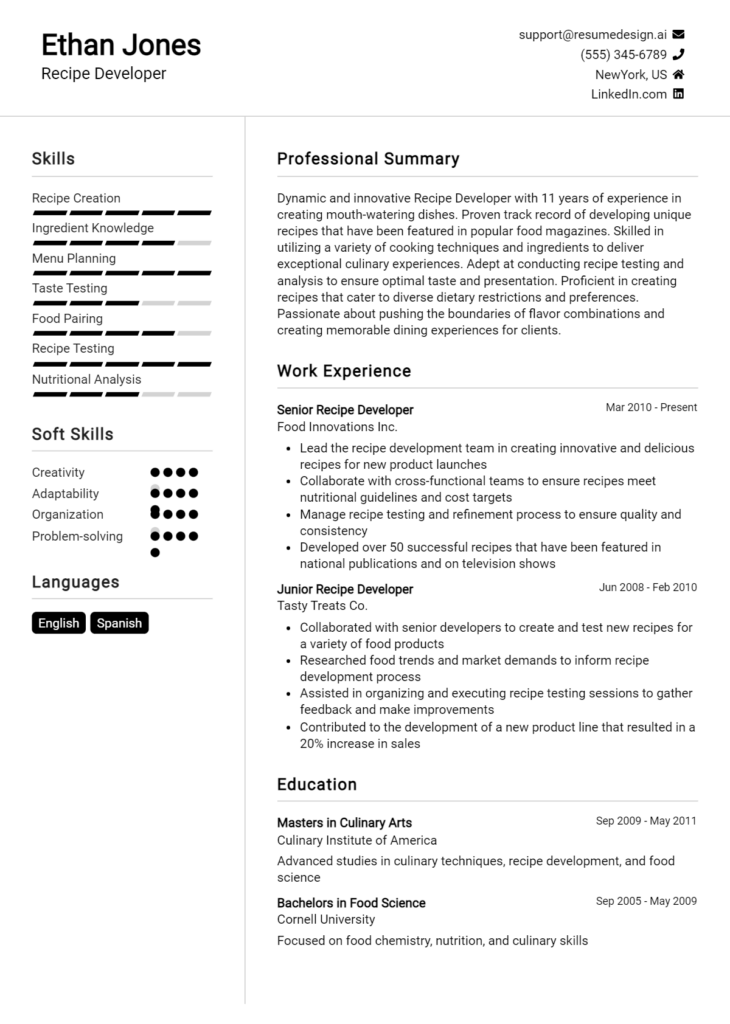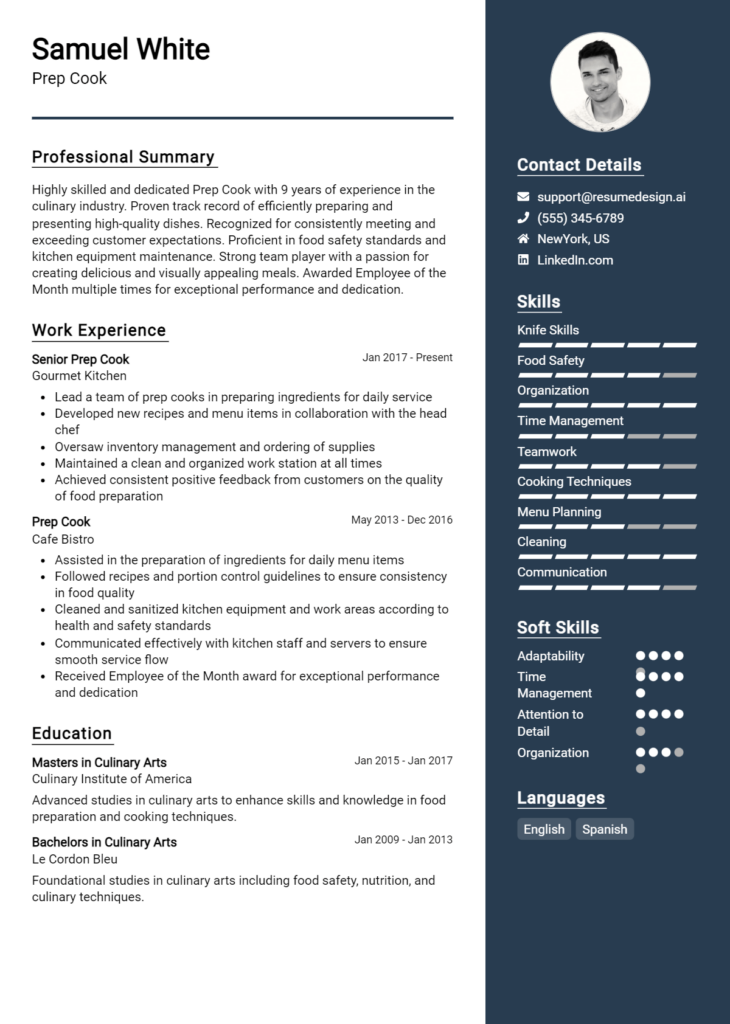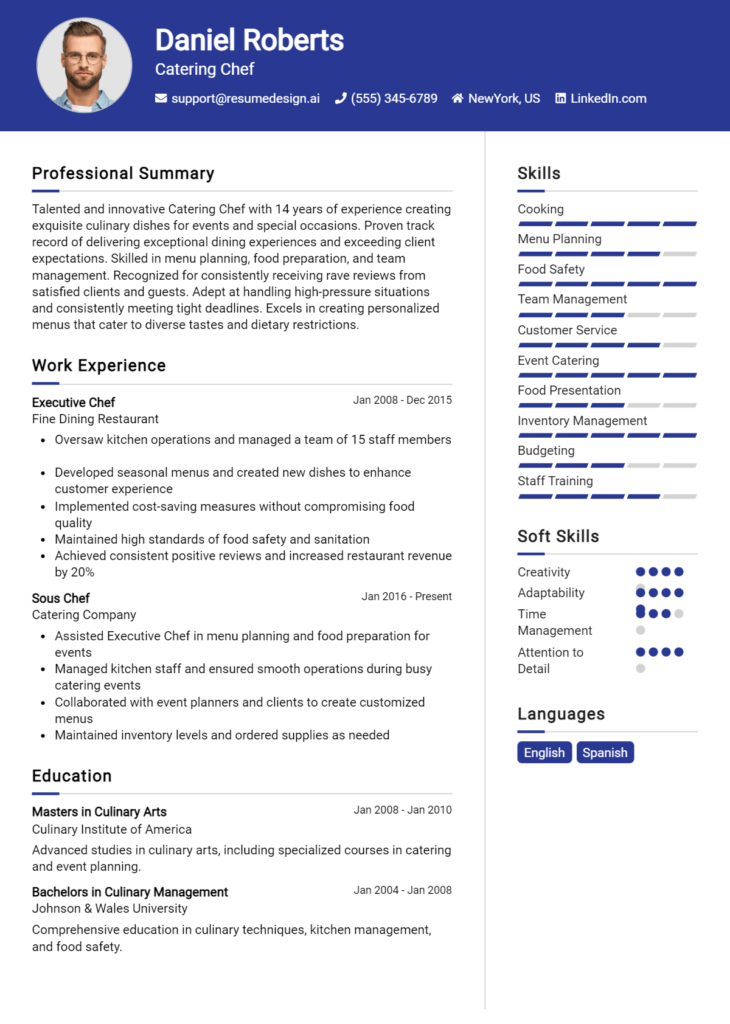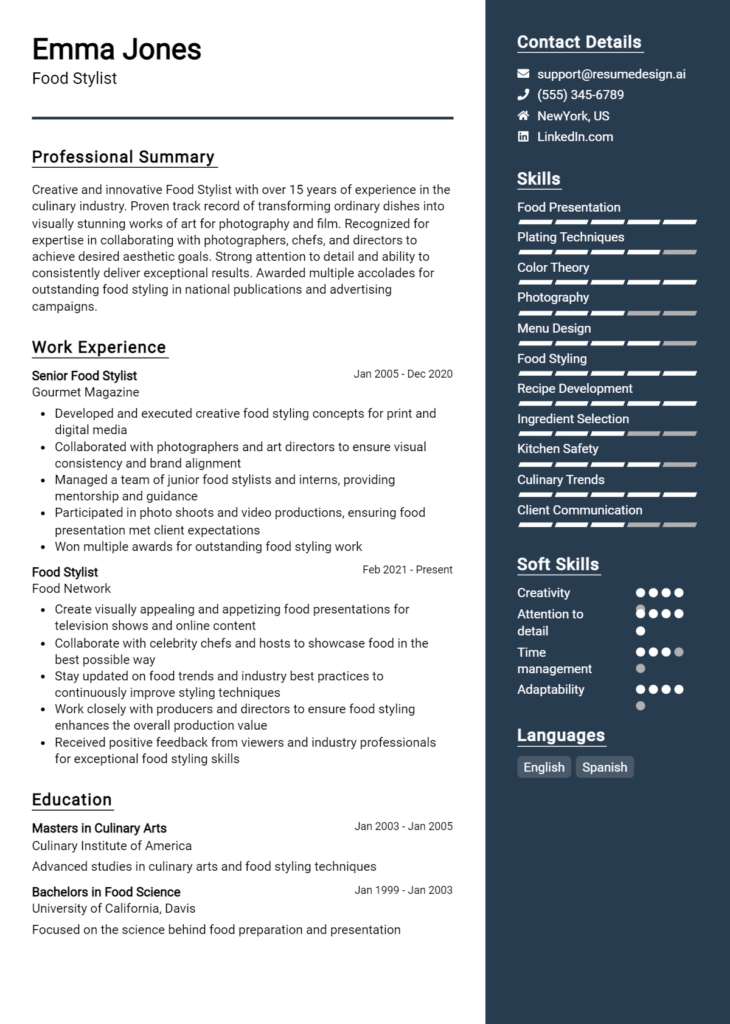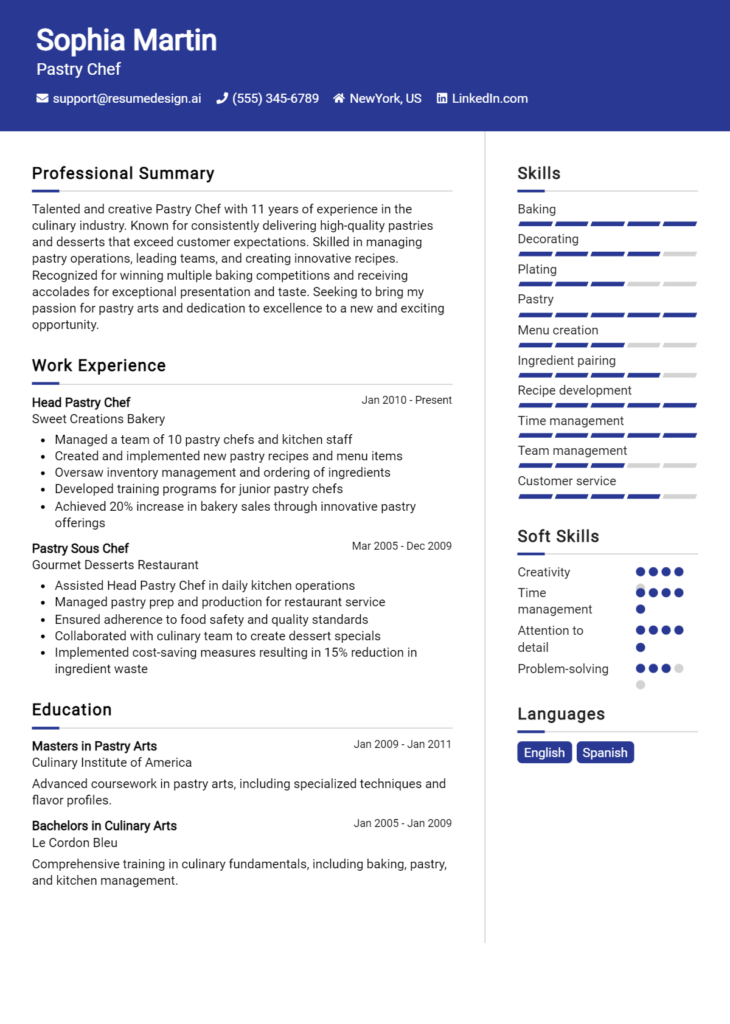Line Cook Core Responsibilities
A Line Cook plays a crucial role in the kitchen, responsible for preparing and cooking meals to meet the restaurant's standards. This position requires technical skills in various cooking techniques, operational efficiency to manage time and resources effectively, and problem-solving abilities to address any issues that arise during service. A Line Cook collaborates closely with kitchen staff and front-of-house teams, ensuring seamless communication and service delivery. Highlighting these competencies in a well-structured resume is essential for showcasing a candidate's qualifications and alignment with the organization's goals.
Common Responsibilities Listed on Line Cook Resume
- Preparing and cooking menu items according to recipes and standards.
- Ensuring food safety and sanitation standards are met.
- Maintaining cleanliness and organization of the kitchen workspace.
- Collaborating with other kitchen staff to ensure smooth operations.
- Assisting in inventory management and food storage.
- Adapting to changing menus and special dietary requests.
- Monitoring cooking times and temperatures for quality control.
- Communicating effectively with front-of-house staff regarding orders.
- Performing prep work for upcoming meals and services.
- Participating in training and development of junior kitchen staff.
- Handling kitchen equipment and tools safely and efficiently.
- Contributing to menu development and recipe testing.
High-Level Resume Tips for Line Cook Professionals
In the competitive world of culinary arts, a well-crafted resume is crucial for Line Cook professionals seeking to make their mark. Your resume is often the first impression you make on potential employers, serving as a personal introduction that showcases your skills, experience, and passion for cooking. This document needs to reflect not only your culinary expertise but also your achievements in the kitchen, setting you apart from the competition. In this guide, we will provide practical and actionable resume tips specifically tailored for Line Cook professionals to help you create a standout resume that captures the attention of hiring managers.
Top Resume Tips for Line Cook Professionals
- Tailor your resume to match the specific job description, emphasizing relevant skills and experiences that align with the role.
- Showcase your culinary experience prominently, detailing previous positions with a focus on responsibilities and achievements.
- Quantify your achievements where possible, such as mentioning the volume of dishes prepared or the reduction in food waste achieved.
- Highlight industry-specific skills, including knowledge of food safety regulations, kitchen equipment, and various cooking techniques.
- Include any relevant certifications, such as ServSafe or culinary school diplomas, to bolster your credibility.
- List any specializations, such as pastry, grilling, or vegetarian cuisine, that can set you apart from other candidates.
- Use action verbs to describe your experiences, making your resume more dynamic and engaging.
- Keep your resume concise and focused, ideally one page, ensuring that the most pertinent information is easily accessible.
- Consider adding a section for professional references or testimonials from previous employers to add depth to your application.
By implementing these tips, you can significantly increase your chances of landing a job in the Line Cook field. A well-structured resume that highlights your skills and achievements not only captures the attention of hiring managers but also demonstrates your professionalism and commitment to your culinary career.
Writing an Exceptional Line Cook Resume Summary
A well-crafted resume summary is vital for a Line Cook as it serves as the first impression for hiring managers. This brief section provides an opportunity to quickly showcase key skills, relevant experience, and notable accomplishments that align with the job role. An impactful summary not only captures attention but also sets the tone for the rest of the resume. It's essential that this summary is concise and tailored specifically to the job the candidate is applying for, highlighting what makes them a perfect fit for the position.
Best Practices for Writing a Line Cook Resume Summary
- Quantify Achievements: Use numbers to demonstrate your impact, such as the volume of meals prepared or customer satisfaction ratings.
- Focus on Skills: Highlight specific culinary skills, techniques, or cuisines that are relevant to the job.
- Tailor the Summary: Customize the summary for each job application, incorporating keywords from the job description.
- Keep it Concise: Aim for 2-4 sentences that effectively communicate your qualifications without overwhelming the reader.
- Highlight Relevant Experience: Mention your years of experience in the kitchen and any specialties that make you stand out.
- Showcase Accomplishments: Include any awards, recognitions, or significant contributions you’ve made in previous roles.
- Use Active Language: Employ strong action verbs that convey your contributions and capabilities confidently.
- Reflect Passion: Convey your enthusiasm for cooking and your commitment to high-quality food preparation.
Example Line Cook Resume Summaries
Strong Resume Summaries
Dedicated Line Cook with over 5 years of experience in high-volume kitchens, successfully increasing kitchen efficiency by 30% through streamlined prep processes and menu innovation. Proven ability to maintain high-quality standards while preparing exquisite dishes, resulting in a 95% customer satisfaction rating.
Detail-oriented culinary professional with a passion for Italian cuisine, skilled in preparing authentic dishes and managing food inventory. Achieved a 20% reduction in food waste through effective inventory management and portion control during a 2-year tenure at Bella Notte Ristorante.
Results-driven Line Cook with expertise in grill and sauté stations, recognized for enhancing food presentation and plating techniques that led to a 15% increase in positive online reviews. Adept at working in fast-paced environments while ensuring adherence to health and safety regulations.
Weak Resume Summaries
Experienced cook looking for a job in the kitchen. I have worked in various restaurants and can prepare food.
Line Cook with some experience in food preparation and cooking. Interested in working in a busy restaurant.
The strong resume summaries stand out due to their specificity, quantifiable achievements, and relevance to the Line Cook role. They highlight concrete skills and experiences, demonstrating how the candidate can add value to a potential employer. In contrast, the weak summaries are vague and generic, lacking detail and measurable outcomes, making them less compelling to hiring managers who seek candidates with proven skills and accomplishments.
Work Experience Section for Line Cook Resume
The work experience section of a Line Cook resume is essential in demonstrating a candidate's technical skills, ability to manage teams, and commitment to delivering high-quality culinary products. This section allows job seekers to highlight their hands-on experience in a fast-paced kitchen environment, showcasing specific competencies such as food preparation, cooking techniques, and adherence to safety standards. Furthermore, quantifying achievements—such as the number of dishes prepared during peak hours or improvements in kitchen efficiency—can significantly bolster a candidate's appeal. Aligning past experiences with industry standards not only illustrates the applicant’s qualifications but also emphasizes their readiness to excel in a professional kitchen setting.
Best Practices for Line Cook Work Experience
- Focus on specific technical skills relevant to the position, such as knife skills, grill operation, or pastry techniques.
- Include quantifiable results, such as the percentage of waste reduction or improvements in food preparation times.
- Highlight leadership experiences, such as training new staff or leading a team during busy shifts.
- Emphasize collaboration with front-of-house staff to ensure seamless service and customer satisfaction.
- Mention any relevant certifications, such as food safety or culinary arts diplomas, to reinforce professional credibility.
- Use action verbs to convey a proactive approach in the kitchen, such as "managed," "created," or "streamlined."
- Tailor experiences to align with the specific requirements of the job you're applying for.
- Keep descriptions concise and focused on achievements that reflect well on your ability to work in high-pressure environments.
Example Work Experiences for Line Cook
Strong Experiences
- Managed a team of 5 cooks during high-volume dinner service, leading to a 30% increase in customer satisfaction ratings as measured by feedback surveys.
- Implemented a new inventory tracking system that reduced food waste by 25%, saving the kitchen over $1,000 monthly.
- Trained and mentored 10 new kitchen staff on food safety protocols and cooking techniques, resulting in improved kitchen efficiency and compliance scores.
- Collaborated with the head chef to develop a seasonal menu that increased weekly sales by 15% during the summer months.
Weak Experiences
- Worked in a kitchen preparing food.
- Helped with cooking and cleaning tasks.
- Followed recipes to make dishes.
- Assisted in the kitchen during busy hours.
The examples categorized as strong experiences effectively communicate specific achievements, quantifiable results, and instances of leadership and teamwork that are vital in a culinary setting. In contrast, the weak experiences lack detail and specificity, failing to showcase the candidate’s skills, contributions, or the impact of their work, which ultimately diminishes their appeal to potential employers.
Certifications and Education for a Line Cook Resume
When crafting a resume for a Line Cook position, it's important to highlight both your certifications and educational background relevant to the culinary field. Here’s how to effectively present this information:
Certifications: Certifications can significantly enhance your resume by showcasing your skills and commitment to food safety and culinary excellence. Here are some key certifications to consider including:
ServSafe Food Handler Certification: This certification demonstrates your knowledge of food safety practices, including proper food handling, storage, and sanitation.
ServSafe Manager Certification: A step above the Food Handler certification, this is ideal for those who may have supervisory responsibilities in the kitchen. It focuses on food safety management practices.
Culinary Arts Certification: Offered by various culinary schools, this certification indicates formal training in cooking techniques, kitchen management, and culinary fundamentals.
Allergens Awareness Certification: This certification is increasingly important as more diners have food allergies. It shows your understanding of how to safely prepare food for those with allergies.
Educational Background: In addition to certifications, your educational background is essential. Here are some examples of relevant educational experiences that can be highlighted:
Culinary School Diploma: A diploma from a culinary arts program can greatly enhance your qualifications, showcasing your formal training in cooking techniques, kitchen operations, and menu planning.
Associate Degree in Culinary Arts: This degree often combines hands-on kitchen experience with coursework in food safety, nutrition, and restaurant management, providing a well-rounded education for aspiring line cooks.
High School Diploma with Culinary Focus: If you completed a high school program that included culinary classes or vocational training, be sure to mention this. It reflects your early commitment to the culinary field.
Workshops and Short Courses: Participation in workshops or short courses, such as knife skills, pastry making, or ethnic cuisines, can also demonstrate your continued learning and passion for cooking.
When listing certifications and education on your resume, be sure to include the name of the certification or degree, the institution that awarded it, and the date you received it. This structured approach will help potential employers quickly assess your qualifications and commitment to the culinary profession.
Top Skills & Keywords for Line Cook Resume
In the competitive culinary industry, a well-crafted resume is essential for aspiring line cooks to stand out. The right blend of skills can make a significant difference in showcasing a candidate's abilities and suitability for the role. Highlighting both soft and hard skills not only demonstrates culinary expertise but also illustrates interpersonal qualities that are crucial in a fast-paced kitchen environment. Employers often look for candidates who can not only execute tasks efficiently but also collaborate effectively with team members. Therefore, emphasizing the proper skills in a Line Cook resume is vital for making a lasting impression and securing a position in a bustling culinary setting.
Top Hard & Soft Skills for Line Cook
Soft Skills
- Teamwork
- Communication
- Time Management
- Adaptability
- Problem-Solving
- Attention to Detail
- Multitasking
- Stress Management
- Creativity
- Customer Service
Hard Skills
- Food Preparation Techniques
- Knife Skills
- Cooking Methods (Grilling, Baking, Sautéing)
- Food Safety and Sanitation
- Inventory Management
- Recipe Development
- Equipment Operation (Grills, Fryers, Ovens)
- Portion Control
- Menu Planning
- Culinary Techniques (e.g., Sous Vide, Braising)
For more information on essential skills and how to present your work experience, consider exploring additional resources to enhance your resume.
Stand Out with a Winning Line Cook Cover Letter
Dear [Hiring Manager's Name],
I am writing to express my enthusiasm for the Line Cook position at [Restaurant Name] as advertised on [where you found the job listing]. With over [number] years of experience in fast-paced kitchen environments, I am confident in my ability to contribute to your team and help elevate the culinary experience you offer to your guests. My background in preparing high-quality dishes while adhering to strict food safety and hygiene standards has equipped me with the necessary skills to excel in this role.
Throughout my career, I have developed a strong foundation in various cooking techniques and cuisine styles, from classic French to modern American. My time at [Previous Restaurant Name] allowed me to hone my skills in sautéing, grilling, and plating, while also gaining experience in inventory management and kitchen organization. I pride myself on my ability to work efficiently under pressure, ensuring that each dish is not only visually appealing but also meets the high standards of taste and quality that your restaurant is known for.
I am particularly drawn to [Restaurant Name] because of its commitment to [specific aspect of the restaurant, e.g., farm-to-table ingredients, innovative dishes, community involvement]. I share your passion for creating memorable dining experiences, and I am eager to bring my culinary creativity and teamwork skills to your esteemed kitchen. I believe that my dedication to continuous improvement and my ability to collaborate with fellow chefs would make me a valuable asset to your team.
Thank you for considering my application. I look forward to the opportunity to discuss how my experience and passion for cooking can contribute to the success of [Restaurant Name]. I am excited about the possibility of working alongside talented chefs and being part of a dynamic kitchen environment. Please feel free to contact me at [your phone number] or [your email] to arrange a conversation.
Sincerely,
[Your Name]
Common Mistakes to Avoid in a Line Cook Resume
When crafting a resume for a line cook position, it's essential to present your skills and experience effectively. However, many candidates make common mistakes that can overshadow their qualifications. By avoiding these pitfalls, you can create a more compelling resume that catches the attention of hiring managers and showcases your culinary expertise.
Neglecting to Tailor the Resume: Sending out a generic resume without customizing it for the specific job can lead to missed opportunities. Highlight relevant experiences and skills that match the job description.
Omitting Relevant Culinary Skills: Failing to list essential cooking techniques or equipment you are proficient with can leave your resume lacking. Be sure to include skills like sautéing, grilling, or proficiency with particular kitchen tools.
Inadequate Work Experience Details: Simply listing previous jobs without describing your responsibilities and achievements can diminish the impact of your experience. Use bullet points to detail your specific contributions and successes in each role.
Ignoring Food Safety Certifications: Not mentioning food safety certifications, such as ServSafe, can be a significant oversight. These certifications demonstrate your commitment to maintaining health standards in the kitchen.
Using Vague Language: Phrases like "responsible for" or "assisted in" do not convey the depth of your experience. Instead, use active verbs and specific examples to highlight your contributions, such as "prepared daily specials" or "managed inventory."
Poor Formatting and Spelling Errors: A cluttered layout or typos can give a negative first impression. Ensure your resume is clean and professional, with consistent formatting and no spelling or grammatical errors.
Lack of Quantifiable Achievements: Not providing metrics or evidence of your success can make your resume less impactful. Include specific achievements, such as "reduced food waste by 20%" or "increased customer satisfaction ratings."
Failing to Include a Summary or Objective Statement: Skipping a brief summary or objective can make it hard for employers to quickly understand your career goals and culinary philosophy. A well-crafted statement can set the tone for the rest of your resume.
Conclusion
In conclusion, being a Line Cook requires a blend of culinary skills, teamwork, and the ability to thrive in a fast-paced environment. Throughout this article, we highlighted the essential responsibilities of a Line Cook, including food preparation, maintaining kitchen cleanliness, and collaborating with fellow kitchen staff. We also discussed the importance of showcasing your skills and experiences effectively on your resume to stand out in the competitive culinary job market.
To enhance your job prospects, we encourage you to take a moment to review and update your Line Cook resume. Ensure that it reflects your unique skills, experiences, and the specific requirements of the positions you are applying for.
For your convenience, we offer a variety of resources to help you create a standout application. Explore our resume templates to find a design that suits your style, use our resume builder for an easy and streamlined experience, and check out our cover letter templates to complement your resume effectively. Take action today and make your application shine!

